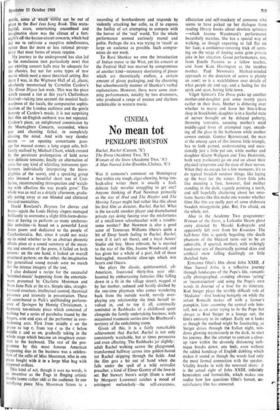Rachel, Rachel (Curzon, 'X')
CINEMA
No mean tot
PENELOPE HOUSTON
The Dress (Academy Two, 'X') Woman of the Snow (Academy Two, 'A') A Man Named John (Essoldo, Chelsea, `U') Was it someone's comment on Hemingway that within any tough, cigar-chewing, bring-'em- back-alive writer there is usually a frail, delicate lady novelist struggling to get out? Anyone thinking of Paul Newman primarily as the star of Hud and The Hustler and The Moving Target might feel rather like this about his first film as director, Rachel, Rachel. What is the ice-cold snooker player and disenchanted private eye doing fussing over the misfortunes of a small-town schoolteacher with a trouble- some mother? But Newman is also a good actor of Tennessee Williams (there's quite a bit of Deep South feeling to Rachel, Rachel, even if it isn't set there), and a loyal Actors' Studio old boy. More relevant, he is married to the star of the film, Joanne Woodward, and has given her a whale of a part, full of those bedraggled, masochistic close-ups which win hearts and Oscars.
She plays the classic, quintessential, all- American, frustrated thirty-five. year old : haunted by embarrassing fantasies (like falling down in a fit in the village street), nagged at by her mother, seduced and hastily ditched by the one-time playmate who comes wandering back from the outside world, nervily over- playing any relationship she finds herself in- volved in, and to top it all, continually reminded in flashbacks of a childhood spent alongside the family undertaking business, with occasional traumatic sorties into the Bluebeard's territory of the embalming room. Given all this, it is a fairly remarkable achievement that Rachel, Rachel is not only consistently watchable, but at times persuasive and even affecting. The flashbacks jar slightly: adult Rachel walking across the playground, transformed halfway across into golden-haired tot Rachel skipping through the fields. And the film gets a bit out of hand when she falls under the spell of a wild revivalist preacher, a kind of Elmer Gantry of the love-in set. But Stewart Stern's script (from a novel by Margaret Laurence) catches a mood of astringent melancholy—the self-awareness, affectation and self-mockery of someone who seems to have picked up her dialogue from reading library books about desolate spinsters —which Joanne Woodward's performance beautifully matches. She has a special way of walking, as though expecting to fall flat on her face; a confidence-restoring trick of seem- ing on the verge of finding some grim private joke in her situation. Good performances, too, from Estelle Parsons as a fellow teacher, and from Kate Harrington as the incubus mother. Paul Newman's Method-minded approach to the direction of actors is plainly an asset; so is a watchfulness over details of what people do and say, and a feeling for the spick and span, boring little town.
Vilgot Sjiiman's The Dress picks up another mother-and-daughter pair some twenty years earlier in their lives. Mother is dithering over whether to marry and leave her brie-à-brae shop in Stockholm; daughter is in a fearful state of nerves brought on by delayed puberty, throwing tantrums, accusing mother's staid middle-aged lover of attempted rape, smash- ing all the glass in the bathroom while mother cowers outside. Gunnar Bjornstrand, the man at the uneasy apex of this intense little triangle, has to look pained, understanding and occa- sionally just a little put out, while mother and daughter (Gunn Wallgren and Tina Hedstrom, both very proficient) go on and on about their physical symptoms and the state of their nerves. When they do escape for a few moments, it's to do typical Swedish outdoor things, like laying up the boat for the winter. Even little jobs like mending a fuse, however, find mother standing in the dark, vaguely pointing a torch, and still hopefully chattering about her emo- tions. Scenes like this make one wonder whether films like this are really part of some elaborate Swedish misogynistic joke. But, I'm afraid, on the whole, not.
Also in the Academy Two programme:' Woman of the Snow, a Lafcadio Hearn ghost story _ directed by Masaki Kobayashi and apparently left over from his Kwaidan. The half-hour film is quietly beguiling (the death phantom of the blizzard turns out to be an admirable, if spectral, mother), with strikingly handsome sets of theatrically painted skies and artificial snow falling dazzlingly on little thatched huts.
Ermanno Olmi's film about John XXIII, A Man Named John, is a reflective journey-
through landscapes of the Pope's life, romanti- cally photographed, avoiding obvious 'acting' or 'reconstruction' and using the Pope's own words in Journal of a Soul for its itinerary. Rod Steiger plays the terribly difficult role of `Mediator'—first looking benignly on while the infant Roncalli makes off with a farmer's pumpkin, later assuming the central role him- self, not as an actor trying to be the Pope but always as Rod Steiger in a lounge suit, the film's emissary to its subject. Early on it looks as though the method might be fascinating, as Steiger drives through the Italian night, win- dows glowing mysteriously in the dark, to start his journey. But the attempt to contain a close- up view within the devoutly distancing tech- nique breaks down, one feels, even without the added handicap of English dubbing which makes it sound as though the words had only the most formal connection with the speaker.
Vitality breaks in with the newsreel shots: it is the actual sight of John -XXIII, infinitely benevolent and formidable, which makes one realise how few questions Olmi's honest, un- satisfactory film has answered.






































 Previous page
Previous page